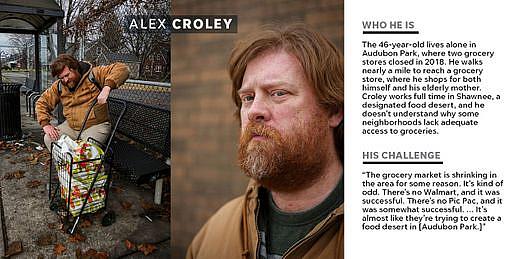How can cities end food deserts? Here are 4 solutions that worked
The Courier Journal's continued coverage of food insecurity in Louisville is supported by the University of Southern California Center for Health Journalism's 2018 National Fellowship.
Other stories in this series include:
Tell us: How do you get food where you live in Louisville?
Dare to Care relocation may bring job training, grocery to the West End
Shelby Park's Save-A-Lot closed with little warning to neighbors
Sorry, we're closed: How everyone is hurt when grocery stores shut down
In 30 seconds: What you should know about food deserts in Louisville
Tuition or food? How college kids use food pantries to help food insecurity
Louisville has a fresh food problem. Can we fix it?
'A real crisis in Louisville': Readers respond to food desert series
How a low-income Louisville neighborhood became a fresh food oasis
How can cities end food deserts? Here are 4 solutions that worked
Louisville families shouldn't be struggling to find fresh food
No grocery store in your neighborhood? Join forces to create one
People can't get to a grocery store easily. So these volunteers are driving them
Would you shop at a mobile grocery store? Kroger is betting on it
Where You Live Determines How Much Your Eggs Cost at Kroger
How some residents get their food in Louisville's food deserts
Louisville's vacant grocery stores find new tenants. But they won't sell food
How these Louisville companies are helping employees buy affordable fresh produce
Can indoor farming fix food deserts? These Louisville students think so
Kentucky's hunger initiative earns national attention. But thousands still need food
Downtown Louisville is growing rapidly. So why doesn't it have a grocery store?
Is crime driving grocery stores out of Louisville's low-income communities?
Louisville kids are still at risk for lead poisoning. Here's how healthy eating can help
When will downtown Louisville get a grocery store? Here's what we found
Everything you need to know about Kroger's mobile grocery store in Louisville
Kroger's mobile market brings fresh food to Louisville neighborhoods without access
This nonprofit leader is giving west Louisville the black-owned grocery it 'deserves'

Across Louisville, people are dreaming of new ways to get healthy food to the neighborhoods that need it.
Could the University of Louisville develop a research grocery store where students test business practices while residents have a place to shop?
What if high school students taught seniors how to order groceries for delivery?
Do we even have to reinvent the wheel?
Grocery stores have been pulling out of low-income communities nationwide for years. And groups from Maryland to California have tested hundreds of policies and initiatives that they hoped could pump fresh food back into the areas the stores abandoned.
As part of a project on food access in Louisville, reporter Bailey Loosemore identified several solutions that have proven successful elsewhere. Take a look:
Virtual Supermarket Program | BALTIMORE
Since 2010, the Baltimore City Health Department has operated a virtual supermarket program that allows residents to order groceries online and pick them up at select locations, including libraries, apartment complexes and senior centers.
There are no delivery fees, and residents can pay for their orders with Electronic Benefit Transfer cards, formerly known as food stamps.
The health department partners with a local grocery operator to fill the orders, and community members are trained to run the sites.
Learn more about the program here.
Dollar Store Restrictions | TULSA
In April 2018, the Oklahoma city passed an ordinance that limits the dispersal of new dollar stores in north Tulsa, a predominantly African-American community with few healthy food options.
Most dollar stores do not offer a range of fresh fruits, vegetables or meat. And the Institute for Local Self-Reliance, a nonprofit that promotes citizen empowerment, argues that companies such as Family Dollar and Dollar Tree saturate communities, making it impossible for grocery stores to take root.
The area has already attracted a new grocery store, which broke ground last year.
Learn more about the ordinance here.
The ReFresh Project | NEW ORLEANS
The ReFresh Project is a collaborative food hub that opened within an abandoned grocery store in 2014. The $20 million project is anchored by a Whole Foods Market, which the company built as pilot "urban format" store.
The hub includes programs that teach people how to cook healthily, grow produce and work in a professional kitchen. It's also home to the Boys Town children and families center and several offices for food-related agencies.
Learn more about the project here.
Healthy Food Financing| PENNSYLVANIA
In 2004, Pennsylvania launched a statewide Fresh Food Financing Initiative, which used public and private dollars to support fresh food projects in low-income neighborhoods.
The state seeded the program with $30 million grant that a financial institution leveraged with $145 million in additional investments, which could be awarded to projects as grants or loans. By 2009, the initiative had attracted 206 applications and approved financing for 88 projects.
Three federal agencies later launched a Healthy Food Financing Initiative modeled on the Pennsylvania program. Since 2011, the federal agencies have disbursed more than $320 million to communities nationwide.
Learn more about the initiative here.
[This story was originally published by Courier Journal.]

